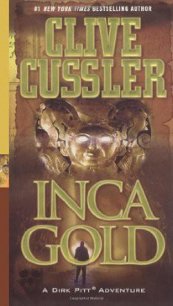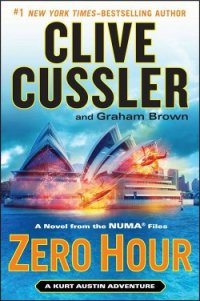Spartan Gold - Cussler Clive (полная версия книги .TXT) 📗
Remi considered this, then nodded. “Sounds good.”
Sam’s e-mail chimed and he read it. “From Selma,” he explained. “The history around the melting down of Bel-Marduk is pretty firm. Plenty of supposedly firsthand accounts of the event, from both the Persians and the Babylonians.”
“That settles it, then,” Remi replied. “Greece it is.”
They spent another hour researching the Greco-Persian War period of Xerxes’ reign, then took a break, dining in the restaurant balcony overlooking the now darkened harbor. The combination of the altitude, the breathtaking scenery, and travel fatigue had left them famished. They tucked into the Bavarian fare with gusto, enjoying a meal of kalte Braten, cold thinly cut roasted pork with bread and horseradish; Kartoffelsalat, a potato salad in a vinegary marinade; and salmon trout fillets simmered in Kristallweissbier and enhanced with a Franconian Bacchus wine served in the traditional flattened bottle known as a Bocksbeutel. Finally they washed down the meal with mugs of ice-cold Weizenbier. Their below-room-temperature choice drew curious stares from a pair of Schonau townsfolk sitting at a nearby table, but Sam’s one-word explanation—“Americans”—drew smiling nods and a free round.
Satiated and slightly tipsy, they returned to their room, ordered a pot of coffee, and got back to work.
“The point of the whole campaign seemed to be the sacking of Athens,” Remi said. “It was the seat of Greek power.”
“Thrace and Macedonia were just warm-up acts,” Sam agreed. “He saved up most of his wrath for Athens. So, let’s make another assumption: Xerxes subjugated the Babylonians by stealing and destroying the Bel-Marduk idol. Wouldn’t he be inclined to do the same thing with the Greeks?”
Remi was already scanning Selma’s report. “I thought I saw something. . . . Yes, here: Delphi.”
“As in the Oracle at Delphi?”
“That’s the one. Xerxes had his sights set on it.”
Located a hundred miles northwest of Athens on the slopes of Mount Parnassus, the sanctuary of Delphi, dedicated to the God Apollo, was a complex of temples that included the Corycian Cave, the Castalian Spring, the Altar of the Chians, the Stoa of the Athenians, and the Temple of Apollo, where the Oracle resided, as well as numerous treasuries, stadiums, and theaters.
In ancient times as well as modern the temple housing the Delphic Oracle was perhaps the most frequently visited in the complex. Truth seekers from across the Mediterranean sought out the Pythia of the day, usually a local woman chosen to temporarily serve as the Oracle’s earthly conduit.
Scientists had in the last few years relieved Delphi of its magical properties, suggesting the seemingly omniscient trance into which the Pythia would fall was in fact caused by methane, carbon dioxide, and hydrogen sulfide fumes leaking from the rock beneath the temple.
An attack on Delphi would have been in keeping with Xerxes’ modus operandi, Sam and Remi knew. Pillaging Delphi would have been tantamount to rendering impotent the Greek gods, similar to what he had done in Babylon with Bel-Marduk.
Remi continued, “Right after he crushed the Spartans at Thermopylae, Xerxes sent a battalion of seven thousand men to sack Delphi. According to legend they were turned away by a timely rockslide sent by Apollo himself.”
“Which may or may not be true, if I recall my ancient history correctly.”
Remi nodded. “There’s a lot of debate about that. Okay, let’s continue the assumption train. What if Xerxes’ raiding party wasn’t turned back? What could they have taken?”
“The Pythia herself, but unless Bondaruk’s looking for a skeleton, that doesn’t seem likely. How about the Omphalos?”
The Omphalos, or “navel,” was a hollow-cored pineapple-shaped stone that was said to have been modeled after a rock that Zeus’s mother, Rhea, wrapped in swaddling rags to trick Zeus’s father, Cro nus, who in a jealous rage was bent on murdering the newborn.
Situated within the Delphic temple, the Omphalos allegedly allowed direct communication with the gods, but again scientists had since speculated that the hollow nature of the Omphalos did little more than funnel hallucinogenic gases into the Pythia’s lungs.
Remi said, “No go. There are plenty of accounts of the Omphalos surviving the war. The problem is, who knows what the truth is? If the British had managed to steal the Declaration of Independence during the War of 1812, how anxious would the U.S. government have been to admit it?”
“True. What else?”
“There were plenty of treasuries at Delphi. Two in particular were said to have been centers of wealth: the Treasury of Argos and the Siphnian Treasury. They had some religious and cultural significance, but they were essentially small-time banks—gold and silver repositories.”
Sam shrugged. “Again, it’s possible, but Kholkov said Bondaruk was after a ‘family legacy.’ That sounds a little more personal than loot from an ancient bank robbery.”
“Plus, he said, ‘finish what was begun a long time ago.’ Sounds like a mission of some kind.”
Sam nodded and a yawn slipped out. “My brain is running out of steam. Let’s call it a night and pick it up tomorrow.”
Thirty miles to the north, Kholkov stepped off the jet bridge and into the airport’s concourse, powering up and checking his BlackBerry’s voice mail as he walked. He stopped suddenly and peered at the screen. The three men with him did the same.
“What is it?” one of them asked.
In response, Kholkov simply grinned and walked to a nearby cluster of chairs, where he sat down. He pulled his laptop from his briefcase, powered it up, then tapped at a series of keys. After thirty seconds he muttered “Gotcha.”
“You have them?”
“Not so smart after all, are we, Fargos?” he said under his breath. He looked up at his compatriots. “They’re just south of us, in Bavaria. Let’s go!”
CHAPTER 46
And soon now you will enjoy my musical talent,” the boat captain said in solid but heavily accented English. He throttled the engine back and the boat began to slow. “To your right you see Echowand—in English it is ‘Echo Wall.’ ”
Along with the boat’s other twenty passengers, Sam and Remi turned in their seats and looked starboard. They were aboard one of the eighteen covered electric passenger boats operated by the Konigssee Boat Company. There were two types—a sixty-footer, which held eighty-five passengers, and Sam and Remi’s model, an eighteen-footer that held twenty-five.
A quarter mile away through the early morning mist they could see a heavily forested cliff rising from the water. The captain lifted a polished flugelhorn from beneath the helm console, put it to his lips, and blew a few mournful notes, then went silent. Two seconds of silence passed and then the sound bounced back in perfect pitch.
The passengers laughed and clapped.
“Please, if you would, my trumpeting is not included in your fare this morning, and it is thirsty work. As you disembark, you may if you wish put Trinkgeld into my cup here or where you see them on the bulkheads. I will divide proceeds between myself and my colleague in the mountains who answered my call.”
More laughter. One passenger asked, “What is Trinkgeld?”
“Drinks money, of course. Thirsty work, the flugelhorn. Okay, now we go on. Next stop, Saint Bartholomae’s Pilgrim Church.”
The ride resumed in near silence, the boat’s electric motors making a soft gurgling hum. They glided along, seemingly suspended in the mist, water hissing along the sides. The air was perfectly calm, but chilled enough that Sam and Remi could see their breath.




